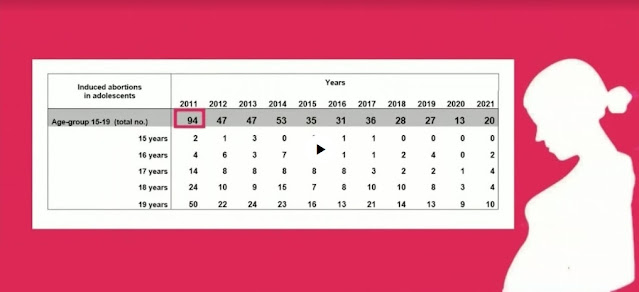 |
In Albania, teenage abortions have fueled discussions on sexual and reproductive health issues. Specialist doctors cast doubt on the decreasing numbers of abortions in the 15-19 age group, as they think that those performed in private health institutions are not reported. Attention is also being paid to sex education in schools, for which experts believe that there is room for improvements in terms of curricula, teacher training, strengthening the role of parents and monitoring. While doctors promote the idea of meetings with students in schools, to familiarize them with the consequences of abortions at an early age.
In Albania, there is a growing concern about sexual and reproductive health in the 15-19 age group. One of the acute problems with risk for the health of girls, for experts and doctors, is related to abortion in this age group. According to official statistics, they account for a low percentage of 0.4% of the total abortions in the country and have decreased by about 80% compared to a decade ago, from 94 to 20 abortions per year, but these data are based only on the reports of public health institutions. Specialist doctors in the field think that the numbers could be higher, due to the underreporting of abortions that are performed in private health institutions, which are more numerous in recent years, as well as new methods through tablets.
"Regarding abortion at the age of 15-19, for us as doctors the situation is not clear. The information is random since we think that a large part of the cases, due to a large number of private clinics and the new methods of abortion with pills, go unrecorded. The situation may be deeper than it appears," Enkeleda Prifti, obstetrician-gynecologist, told the Voice of America.
The minimum age limit for sexual intercourse in Albania is 14 years. Reproductive health researchers and civil society advocates think that the best way to prevent teenage abortions is sex education through school and family.
Official authorities say that school education is based on some Western experiences. It begins with the concepts of reproduction at ages 7-11 and progresses further to age 18 through biology, civics, and physical education subjects.
Students, according to officials, receive sufficient knowledge on fertility, sexually transmitted diseases, abortion, etc. But some students of a high school in Tirana gave different opinions to the Voice of America, if the knowledge they receive according to this method is sufficient, and if these issues are still taboo.
"Knowledge on sexual education is mostly obtained in biology, but I don't believe it is enough. Children should be educated earlier. This is a very important topic in everyday life, and I don't think it's taught early enough," a high school girl told VOA.
"It's enough, as far as I know, there have been programs for sex education since elementary school and 9 years old," said another high school student.
"Knowledge is enough because we get it through the subject of biology," said another student.
"We get enough information, everything is fine," said a boy in one of Tirana's high schools.
"Most people may be ashamed, but it's not a shame to learn about the life," said a high school student.
"We get more knowledge in the subject of biology and in the scientific aspect, it is not included in deeper education, which I believe schools lack. There should be more information about safeguards. It is still considered something shameful. Adolescents have very little information about these topics," continued a high school student.
These students asked to remain anonymous, which also shows that talking openly about sex education today is still taboo in Albania. Officials of the Ministry of Education say that the knowledge on sexual and reproductive education in schools is continuously reviewed in order to improve. Although there is an optional module, i.e. a non-graded subject, the main focus for the authorities remains the acquisition of knowledge about sexuality education, through cross-curricular activities in several subjects.
